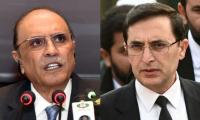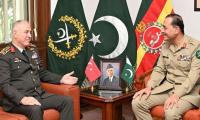LONDON: Britain on Tuesday said it was suspending military exports to Turkey following its incursion into northeastern Syria, as it carries out a review of arms sales to its Nato ally.
“We will keep our defence exports to Turkey under very careful and continual review,” Foreign Secretary Dominic Raab said in a statement to parliament. “No further export licences to Turkey for items which might be used in military operations in Syria will be granted while we conduct that review.”
Ankara’s assault against Kurdish forces launched last week has prompted a chorus of international condemnation. Raab said it had “seriously undermined the security and stability of the region”. He told lawmakers: “This is not the action we expected from an ally, it is reckless, counterproductive, it plays straight into the hands of Russia and the Assad regime.”
Nato Secretary General Jens Stoltenberg discussed the volatile situation with Prime Minister Boris Johnson in Downing Street on Tuesday. Speaking after the meeting, Stoltenberg said the arms suspensions showed “many Nato allies are very critical and are condemning the military operation in northern Syria”.
Britain’s halting of military sales to Turkey follows similar moves by key European and Nato allies, including Germany—one of Ankara’s main arms suppliers—and France.Meanwhile, US President Donald Trump warned on Monday that Turkey faces imminent sanctions over its actions but also signalled that Washington would avoid any armed conflict with Ankara.
Turkey’s President Recep Tayyip Erdogan has said threats of sanctions and arms embargoes by Western powers will not stop the military offensive. He vowed to continue the operation targeting the Syrian Kurdish People’s Protection Units (YPG), which it sees as a “terrorist” off-shoot of Kurdish insurgents in its own territory, until “our objectives have been achieved”.
Erdogan has said he wants to establish a safe zone stretching across northern Syria, to which it can repatriate many of the 3.6 million refugees that it is hosting from the Syrian conflict.
JUI-F filed a petition through advocate Kamran Murtaza
New data from 187 countries shows that the estimated number of deaths from viral hepatitis increased from 1.1 million...
APTMA also drew the attention of the finance minister toward high taxes and persistent delays in refunds have squeezed...
The guard appeared at the Westminster Magistrates Court on Wednesday afternoon with his lawyer Moeen Khan
Ogra determines the natural gas tariff for domestic sector consumers and LNG price separately for power sector
The chief minister directed prompt completion of the Lahore Ring Road SL-3 project and urged immediate action







